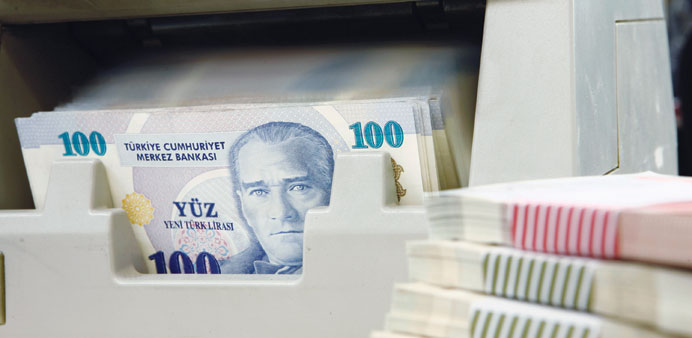Turkish 100 Lira notes are counted at a bank in Istanbul. The lira and domestic bonds have outperformed most emerging markets since the day after the June 7 vote as the third-highest yields among peers and the currency’s worst first half of any year since 2006 lured some investors.
Bloomberg/Istanbul/London
The bounce in Turkish assets since elections last month is failing to convince money managers to put cash back into the country, according to PineBridge Investments.
The lira and domestic bonds have outperformed most emerging markets since the day after the June 7 vote as the third-highest yields among peers and the currency’s worst first half of any year since 2006 lured some investors. Anders Faergemann, who helps oversee about $76bn at PineBridge as managing director in London, said that while there may be room for short-term gains, investors would need to see some clarity on the shape of a government before re-committing to Turkey.
“When we look at valuations - domestic bonds at double digits and the currency already at depreciated levels - on a relative basis Turkey stacks up quite well,” Faergemann said by e-mail on Monday. “But I think long-term investors are shying away from Turkey at the moment.”
Turkish voters last month stripped President Recep Tayyip Erdogan’s ruling AK Party of the parliamentary majority it enjoyed for 13 years, raising the prospect of a coalition or repeat elections. While the lira tumbled to a record low on June 8, it has since strengthened 2.8% and two-year yields have fallen 43 basis points to 9.76%.
With conflicts of interest between the opposition parties that are “just enormous,” the prospect of another election “is probably not something the market will take lightly,” Faergemann said.
Turkey’s current-account deficit and weak economic growth are also a concern, he said.
Erdogan last week urged political party leaders to form a coalition government as soon as possible and warned against dragging Turkey into political instability. The country’s three opposition parties have refused to join a government unless Erdogan gives up his push for enhanced powers and accepts the president’s largely ceremonial role.
The lira tumbled 13% in the first half as the Federal Reserve moved closer to raising interest rates, damping demand for emerging-market assets.
Turkey’s current-account gap is forecast at 4.9% of gross domestic product this year, according to a Bloomberg survey of economists. While that’s down from 5.8% in 2014, it’s the biggest shortfall among the Group of 20 major countries, making it more vulnerable to shifts in global investor sentiment, the data show.
The nation’s economy will probably grow 3% in 2015, less than the 5.4% average in the past five years, the data show.
Prospects for higher US rates and the risk that Greece will leave the euro warrant a cautious stance on Turkey, according to Piotr Matys, an emerging-market strategist at Rabobank in London.
“You could argue that Turkish bonds offer attractive yields, but I’m sceptical that we will witness a substantial wave of capital inflows at the time when the Fed intends to raise interest rates,” Matys said on Monday. “In the short- term, demand for risky assets will also be limited by Greece.”
For Ogeday Topcular, who helps oversee $250mn in emerging-market debt at Ram Capital SA in Geneva, Turkey’s elections diminished the risk of continued intervention by the AK Party on central bank policy. He’s boosted his allocation for Turkish dollar debt to 10% of his portfolio from zero before the election, he said. “The market priced the worst in my opinion,” Topcular said by e-mail on Monday. “It is a good time to accumulate some Turkey risk.”
Hakan Aksoy, a London-based senior bond fund manager at Pioneer Investments, which oversees $244bn globally, said he’s bought local bonds since the election.
“It was a short-term bet,” Aksoy said. “I think they will form a coalition.”
Turkey is a trade for two or three months, according to PineBridge’s Faergemann.
“There is value in Turkey’s external debt here,” he said. “But I do think that the political uncertainty may change that picture and investors may demand a higher risk premium.”

